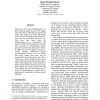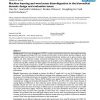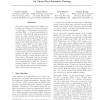21 search results - page 4 / 5 » Knowledge-Rich Word Sense Disambiguation Rivaling Supervised... |
ACL
2008
13 years 9 months ago
2008
Supervised word sense disambiguation requires training corpora that have been tagged with word senses, which begs the question of which word senses to tag with. The default choice...
BMCBI
2006
13 years 7 months ago
2006
Background: Word sense disambiguation (WSD) is critical in the biomedical domain for improving the precision of natural language processing (NLP), text mining, and information ret...
JMLR
2012
11 years 10 months ago
2012
Open-text semantic parsers are designed to interpret any statement in natural language by inferring a corresponding meaning representation (MR – a formal representation of its s...
COLING
2008
13 years 9 months ago
2008
Supervised approaches to Word Sense Disambiguation (WSD) have been shown to outperform other approaches but are hampered by reliance on labeled training examples (the data acquisi...
EMNLP
2010
13 years 5 months ago
2010
We describe a model for the lexical analysis of Arabic text, using the lists of alternatives supplied by a broad-coverage morphological analyzer, SAMA, which include stable lemma ...



